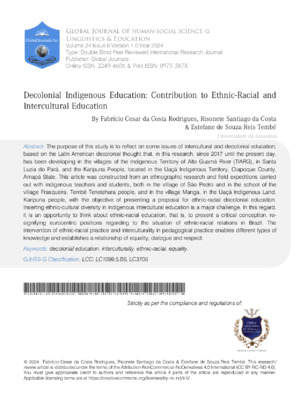Decolonial Indigenous Education: Contribution to Ethnic-Racial and Intercultural Education
Keywords:
decolonial education interculturality ethnicracial equality
Abstract
The purpose of this study is to reflect on some issues of intercultural and decolonial education based on the Latin American decolonial thought that in this research since 2017 until the present day has been developing in the villages of the Indigenous Territory of Alto Guam River TIARG in Santa Luzia do Par and the Karipuna People located in the Ua Indigenous Territory Oiapoque County Amap State This article was constructed from an ethnographic research and field expeditions carried out with indigenous teachers and students both in the village of S o Pedro and in the school of the village Frasqueira Temb Tenetehara people and in the village Manga in the Ua Indigenous Land Karipuna people with the objective of presenting a proposal for ethnic-racial decolonial education Inserting ethnic-cultural diversity in indigenous intercultural education is a major challenge In this regard it is an opportunity to think about ethnic-racial education that is to present a critical conception re-signifying eurocentric positions regarding to the situation of ethnic-racial relations in Brazil The intervention of ethnic-racial practice and interculturality in pedagogical practice enables different types of knowledge and establishes a relationship of equality dialogue and respect
Downloads
How to Cite
References

Published
2024-08-24
Issue
Section
License
Copyright (c) 2024 Authors and Global Journals Private Limited

This work is licensed under a Creative Commons Attribution 4.0 International License.